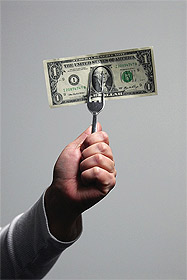News Archives - 2009
Give to the FoodLess FoodDrive
 Food drives generally mean the return of big, bulky barrels to Christensen Center. Donors pull some canned goods out of the back of their pantry. Or they pick up a few things on their next trip to the grocery store.
Food drives generally mean the return of big, bulky barrels to Christensen Center. Donors pull some canned goods out of the back of their pantry. Or they pick up a few things on their next trip to the grocery store.
But is that really the best way to help restock a food shelf?
Maybe not. After all, the barrels are heavy and occasionally contain garbage or other items not meant for the food shelves. That can of pork and beans might not be something that people from other cultures are interested in. And paying retail at the grocery story, while appreciated, isn't perhaps the best use of your money.
Because of that, Augsburg College is conducting a FoodLess FoodDrive to support the Brian Coyle Communitiy Center food shelf as part of Minnesota FoodShare's March campaign.
Augsburg is hoping to raise $3,000 in cash. Faculty and staff members will receive an envelope in their campus box this week. In addition, there will be opportunities for faculty and staff to donate money in the Commons as A'viands is also a partner in the FoodLess FoodDrive.
"We're trying to change the whole idea of a food drive," said Brian Noy, the director of the Campus Kitchen program. "Cash is worth about four times as much to a food shelf. Plus they can purchase more and get exactly what the center needs."
That's why the $3,000 mark is an important goal. That would essentially provide a month's worth of food for Brian Coyle. Right now, about $12,000 worth of food is distributed there monthly. Through commodity programs and bulk buying programs, the Center can turn $3,000 in cash into $12,000 in food.
"Ninety percent of the food in our food shelf is purchased," said Rebecca Burand, the basic needs coordinator at the Brian Coyle Community Center. "And we can purchase quite a bit more than you could at Cub or Rainbow."
Not only do cash donations allow for the purchase of more food, they also enable the staff to purchase food that is used by residents in the Cedar-Riverside neighborhood. Burand said about 80 percent of the people who use the Brian Coyle food shelf are East African or Somali.
The timing is also important.
"In November and December, we get lots of donations," Burand said. "By the time we get to March, the shelves get pretty empty."